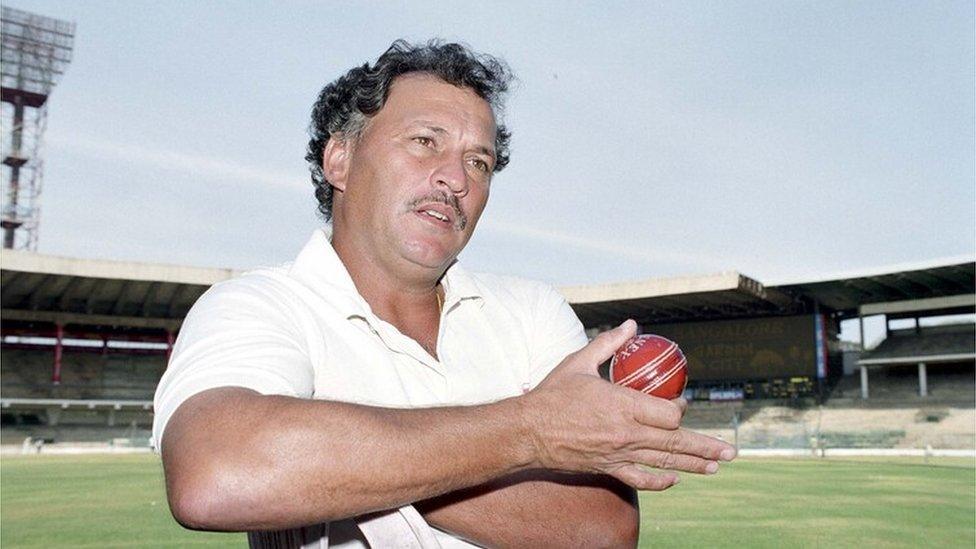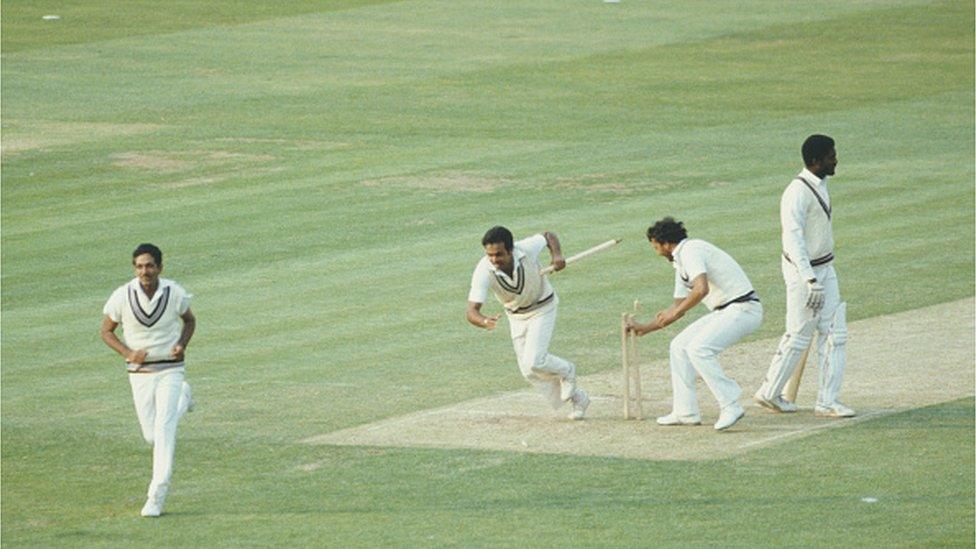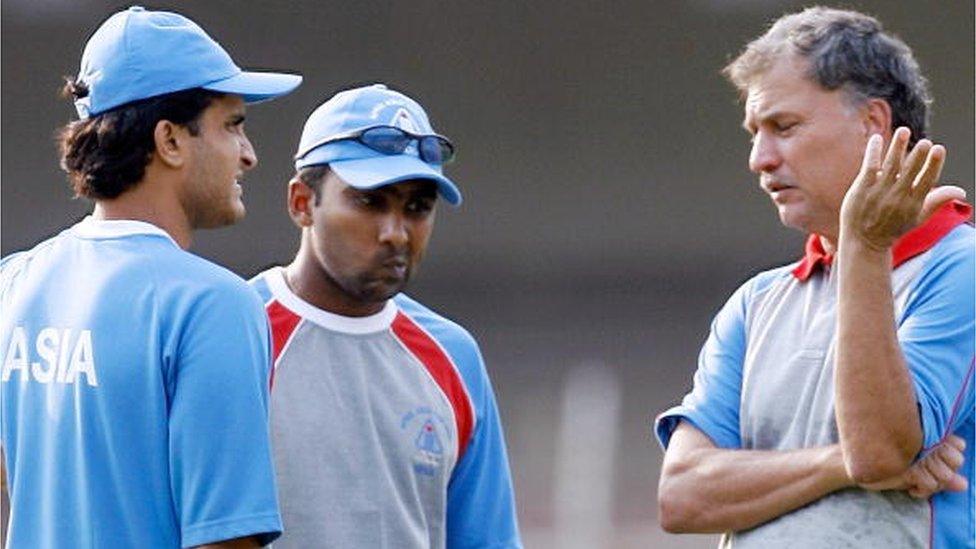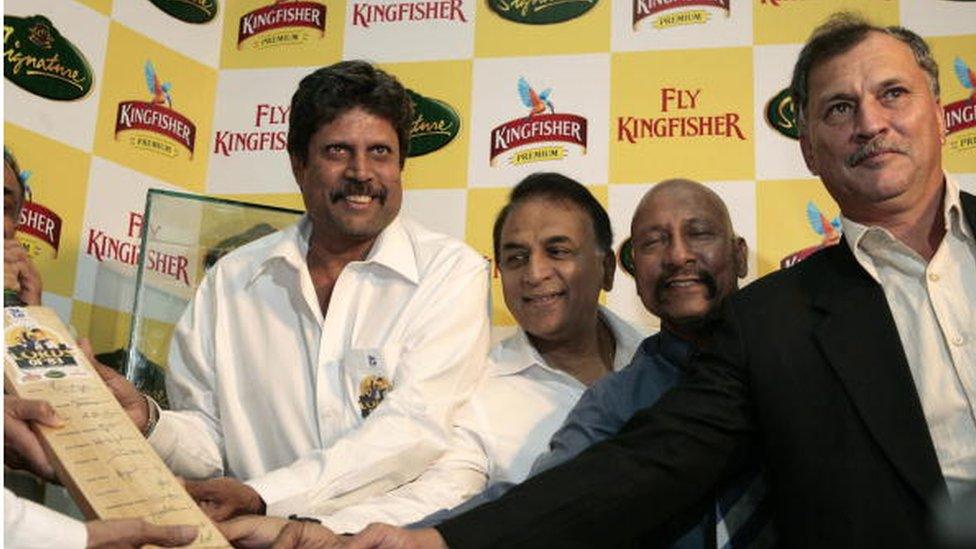Roger Binny: Meet the man replacing Saurav Ganguly as BCCI chief
- Published

Binny was a bowler who troubled the best with his swing and somewhat unorthodox action
Roger Michael Humphrey Binny - many friends like to call him by his full name - is one of the good guys.
His elevation as president of the Board of Control for Cricket in India (BCCI) on Tuesday is both timely and necessary after years of instability and court cases involving the richest sports governing body in India.
A natural athlete, Binny had already made a name for himself in school sports (hockey, football, athletics) when I first met him.
I was at the selection trials in college, hoping to make it into a team which already had some of Karnataka state's finest junior cricketers and university stars (and future stalwarts of the game).
Binny, who had joined the college that year, had turned up for selection too. He didn't need to.
He had already opened the batting for Karnataka in the Ranji Trophy (India's top domestic tournament), played for them in the Irani Trophy against the Rest of India, and was just half a step from playing for India.
The Irani Trophy is a tournament between the champions of the Ranji trophy and a team that picks the best players from the rest of Indian states.
His humility which struck me then, and his sense of cricketing protocol never left him. In the end, he didn't play for us. The bank that had been pursuing him finally got him to sign up.

Binny's (second from right) 18 wickets in the 1983 World Cup played a key role in India winning the title
Cricket was his future, and as an international, then talent scout, selector, coach and administrator he showed he was an all-rounder off field too. No previous president of the BCCI has his range of qualifications. A grassroots man getting the top job accounts for some of the satisfaction at the news of his promotion.
When India won the second Test in the 1986 series in England (and with it the series, 2-0), it was largely owing to the batting of Dilip Vengsarkar and the bowling of Binny (5-40 in the first innings).
Three years earlier, Binny's 18 wickets in the World Cup had played a key role in India winning the title. His best figures, 6-56, came in the drawn Test against Pakistan in Kolkata (previously known as Calcutta).
Still, Binny has one of the quirkiest records in India.
In domestic cricket, he was a batter with power and finesse, sometimes hitting fast bowlers over extra cover for six off the back foot. In international cricket, however, he was a bowler who troubled the best with his swing and somewhat unorthodox action.
A double century in the Ranji Trophy and an opening partnership of 451 (unbroken) with Sanjay Desai stood as the national record for 19 years. Wherever he played, he was a superb fielder with a flat throw from the outfield, as well as a safe pair of hands close in.

Binny (right) has been in a coach in the past
He played 27 Tests, 72 one-day internationals, and in all first-class cricket averaged 34 with the bat and took 205 wickets.
His finest Test innings came under pressure. In the Jubilee Test against England in Mumbai, he opened both batting and bowling for India.
In its 94-year history, the BCCI has had only two other Test players as full-time Presidents; Binny's immediate predecessor Sourav Ganguly, and the Maharajkumar of Vizianagaram (1954-56). Shivlal Yadav and Sunil Gavaskar chipped in briefly on an ad-hoc basis.
Neither his personal history nor the cricket board is likely to weigh much on Binny when he takes office.
For all its internal politics and special interest shown by politicians and their families, the national cricket teams have, in recent years, seldom been affected by the goings-on in the board rooms.
As the most influential national board in the game, what India thinks and says will shape the game globally.
And this is where Binny's greatest challenge lies. He will have to steer a path between white ball and red-ball cricket, ensuring that the former doesn't overwhelm and the latter retains its importance.

Binny (right) with members of the World Cup winning team, Kapil Dev, Sunil Gavaskar and Syed Kirmani
Domestically, he will have to ensure that first-class cricket and women's cricket thrive, and players here and at lower levels find it financially worthwhile to continue playing the game.
The BCCI's structure is such that the real power lies with the secretary, and the president's is a steering job rather than one deciding on the destination.
Binny's cricketing credentials may or may not trump the wishes of those in his team who have no background in the game, and that's another balancing act he will have to pull off.
Of the many advantages he has, his equanimous temperament and ability to get people to work together are the most important.
Good guys sometimes have to thwart the designs of the bad guys. How well Roger Binny does that will decide his legacy.

Read more India stories from the BBC:
